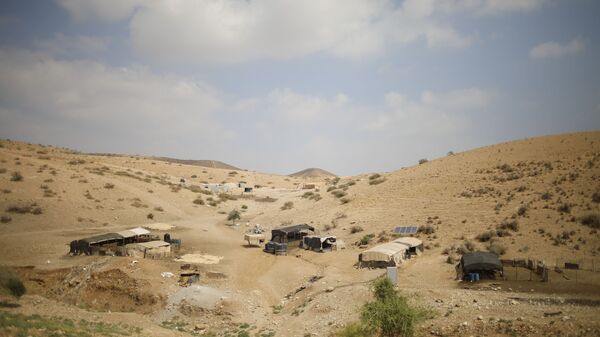The Palestinian movement Hamas, which controls the Gaza Strip, has warned Israel against plans to extend sovereignty over areas in the West Bank, including the strategic Jordan Valley.
Hamas’s Jerusalem Affairs Office said in a statement on Sunday that "Jerusalem will remain a Palestinian, Arab, and Islamic city and the eternal capital of the Palestinian state, and all powers on this planet will not be able to change its identity, address, and history".
The statement added that "the occupation and its plots against Jerusalem and Palestine will be doomed to failure and its conspiracies will not secure a future for its existence on the Palestinian land".
Hamas also slammed what it described as "the ominous deal of the century" related to the Palestinian-Israeli peace settlement, saying that some countries had already entered the "flagrant stage of normalising relations" with Tel Aviv "through political, economic, cultural, sports, and artistic trajectories in defiance of the dignity and will of the Arab and Muslim peoples who have long supported the Palestinian people in their long struggle with the Zionist enemy".
The militant group also urged the Palestinian Authority to withdraw from the "disastrous" Oslo Accords, signed in the 1990s and aimed at resolving the Israeli-Palestinian conflict in sync with UN Security Council Resolutions 242 and 338.
Jordan’s King Warns of Repercussions From Israel’s West Bank-Related Plans
The statement comes after Jordan's King Abdulla II warned Israel in mid-May of a "massive conflict" with the Hashemite Kingdom if the Jewish state proceeds with its extension of sovereignty over areas of the West Bank.
"Leaders who advocate a one-state solution do not understand what that would mean. What would happen if the Palestinian National Authority collapsed? There would be more chaos and extremism in the region", he said in an interview with the magazine Der Spiegel.
The King was apparently referring to the so-called two-state solution which implies establishing two states, Israel and one for the Palestinians on the disputed territories of the West Bank, including East Jerusalem, and the Gaza Strip.
He made it clear that even though he doesn’t want "to make threats and create a loggerheads atmosphere", Jordan is "considering all options".
This was preceded by Israel’s Prime Minister Benjamin Netanyahu and his main political rival, Benny Gantz, clinching a coalition deal in April, which stipulates that the Israeli government can start considering the implementation of the West Bank-related extension of sovereignty as of 1 July, in sync with US President Donald Trump's Middle East plan.
Earlier, US Ambassador to Israel David Friedman announced that the Trump administration was ready to recognise Israel’s extension of sovereignty over 30 percent of the West Bank.
POTUS Unveils ‘Deal of the Century’
Trump revealed his Middle East peace plan in late January, touting it as the "deal of the century".
The blueprint proposes the creation of a Palestinian state alongside Israel, but with its capital on the outskirts of East Jerusalem, rather than inside it. Under the plan, the scattered Palestinian territories would be united by a system of highways, bridges, and tunnels.
The plan was immediately rejected by Palestinian President Mahmoud Abbas, who said that Jerusalem was "not for sale", and that the deal would be thrown into the "garbage can of history" by Palestinians.
Last month, Abbas told Al Jazeera that "the Palestine Liberation Organisation and the Palestinian State […] has discharged all obligations under all agreements with the governments of the United States and Israel, including those related to security".



